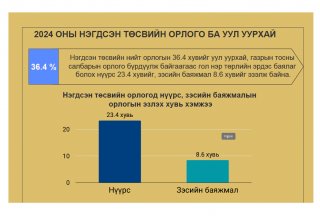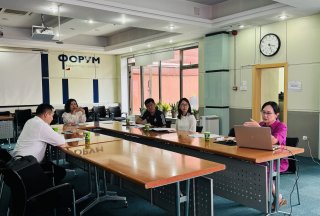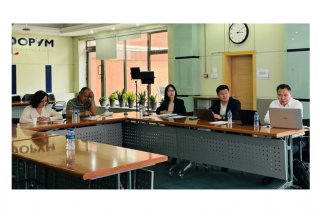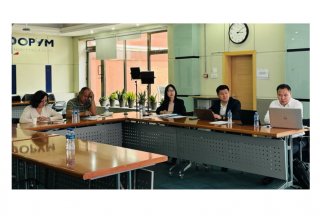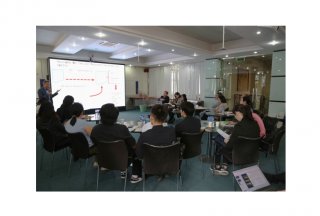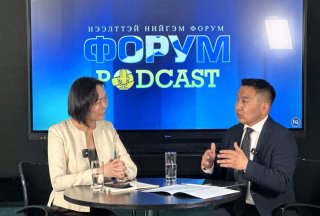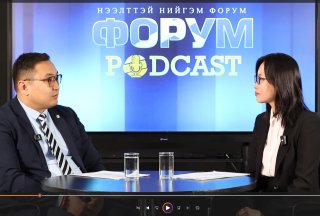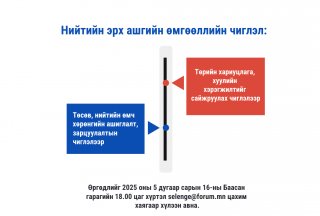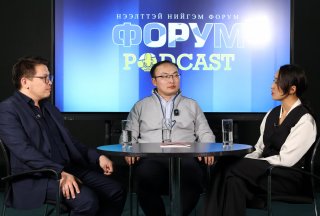J.Enkhsaihan
Civil Society Development in Summary
In the history of Mongolia the civil society took the forms of a) people’s movement led by the national feudal nobility with an aim to overthrow the Manchu colonial power; b) quasi-governmental public organizations with a mission to transform the Mongolian people into “homo socialisticus”; and c) the 1990s’ national movement for democracy and, thereafter, relatively independent entities specialized in particular areas and numbered in thousands.
In the pre-transition period or until 1990 there were a range of public organizations like women’s and youth caucuses of the MPRP, trade unions, association of mountaineers, the Red Cross. Though some of them were not directly established by the MPRP, there was no NGO in fact that could have been formed without the MPRP sanction. These organizations were to uphold the ideology and to assist the party-state in achieving the social, cultural, political, and economic goals of building the socialist society. They had a top-to-down organizational structure, were dependent from the party-state power, and had a considerable role in the society. They were financed by the party-state or membership fees (which were directly taxed from the members’ wages and salaries). Therefore, these organizations were dependent on the state and the participation therein was more compulsory than voluntary.
Nevertheless, these organizations played a number of important roles in the development of civil society. These NGOs made citizens organized and created the citizens’ capacity to cooperate within the public, to collect and disseminate information (though ideological), and to collaborate with the modern state. It was this capacity and its dissemination that helped establish many citizens’ movements and organizations during the transition period.
Opportunities to carry out democratic reforms were created thanks to the changes outside the country and efforts by the democratic movements such as the Mongolian social-democratic movement, the Democratic movement, the National democratic movement, who succeeded to mobilize the public in demanding the step-down of the MPRP Political Bureau, drafting of the democratic Constitution and forming of a new Government by popular elections. These new movements opened political conditions for the citizens’ free association and their independent activities and created environment for establishing the first opposition parties.
The adoption of the democratic Constitution and the organization of the first free and fair parliamentary elections had a positive impact on creation of new types of citizens’ movement and organization. The new organizations include many influencing and monitoring NGOs of a western nature, of specialized profile, with own policy and platform, of professional nature, with a purpose to influence the state policy and to keep the government accountable. As the new Constitution guarantees the religious freedom, numerous organizations of Buddhist and other religions have emerged. The NGOs that had had their roots in socialism also have been re-considering and re-defining their mission and role and their relationship with the MPRP and the state and act accordingly.
At the beginning of the 1990s, the development of the NGOs was supported in terms of financing, technical assistance and solidarity by foreign entities and some international organizations such as the US Asia Foundation, the Conrad Adenauer Foundation of Germany, the US Agency for International Development, the UNDP, the US National Foundation for Democracy, the International Development Agency of Australia, and the UNIFEM. In February 1997 the State Great Hural passed the Law on NGOs which has contributed greatly to ensuring the further development of the NGOs. Starting from the late 1990s, the focus of the support of the foreign foundations and organizations has shifted from concentrating on the political aspects of democracy or on the influencing and monitoring roles of the NGOs to the social and economic roles or social services distribution roles of the non-governmental sector.
Understanding of civil society and the NGOs
The Constitution of 1992 declares that the Mongolian people “shall have the mission of building and developing human and democratic civil society in the country”. Though the government as referred to in the Constitution and the state organizations shall have a leading role in building such a society, all non-governmental entities shall play also an important role.
The NGOs, newly born since the early 1990s and truly based on the citizens’ initiatives, have been carrying out activities in political, social, economic, cultural and other areas and their active participation and actions have been felt fruitful recently in many parts of the society. This has encouraged a policy to increase the effectiveness of the NGOs through analyzes and studies of all aspects of their activities. For example, during 2004-2005 the Center for Civic Alliance carried out a comprehensive study on the state and future of the Mongolian civil society within the framework of the research works to implement the decisions of the Forum of International Civil Societies for Democracy. The study used the methodology of Civil Society Index worked out by the World Association for Support of Citizens’ Participation (CIVICUS) and many other sources of information and methodology and involved a wide participation of the public. It employed four indicators: structure of the society, external environment, values, and impacts; and identified both the disadvantages and the advantages of the civil society. Also the Center of Democracy Education (DEMO) commissioned in 2005 a study on the state of the NGOs in Mongolia with the support of the Open Society Forum. This study focused on 8 aspects related to NGOs: registration, types and forms, distribution of location, activity orientation, structure, taxation, reporting, and finance. Today many NGOs are engaged in similar studies.
Until the mid-1990s the civil society organizations in Mongolia in most cases had a common name as non-governmental organizations. Later the two terminologies have become used separately. The general understanding as civil society would include all types of NGOs and, in addition, all permanent and ad-hoc organizations such as trade unions, the Mongolian Chamber of Commerce and Industry (MCCI), savings and credit cooperatives (SCC), political parties, religious organizations, unions of apartment owners, movements for health and other issues, etc. Also included here are private sector donations for the benefits of the society and philanthropic and other similar activities.
The law that regulates the activities of NGOs – the major component of the civil society – has been in service for already 10 years. Also there are legislative acts regulating activities of trade unions, political parties, churches and monasteries, the Red Cross and a few others. However, there is no legislation yet for the overall regulation of the civil society.
As stipulated in Article 6 of the Law on NGOs, these organizations shall become legal entities upon registration with the State Registry. By the end of 2006, some 6,000 NGOs have been registered with the Ministry of Justice and Interior. But no comprehensive study and registration have been conducted with regard to the total number of organizations of civil society and the number of employed in this sector throughout Mongolia. The structure, management and organization of the NGOs and other above-said entities regulated by legislative acts and the question how they conduct their activities have not been completely studied. As most of the researchers consider, the civil society organizations (CSOs) apply in their activities the provisions of the 1997 Law.
Law on NGOs
The main purpose of the 1997 Law is to regulate relations concerning the association of citizens and the establishment and activities of NGOs. This 25-article Law regulates issues of establishment and dissolution of NGOs, relations of the state with NGOs and general requirements for NGOs (for example, compulsory provisions to be included in its by-law, principles of its management and organization, financing, reporting, liabilities for violation of legislation). Although the Law can be considered as playing its role satisfactorily in the certain stage of the society’s development, the time has come to improve some provisions taking into account the practical implementation experiences and difficulties encountered in the past with regard these provisions. For example, there is a need to reconsider the definition of a NGO (Article 4), the provision of establishment of NGO by a citizen individually (Article 5), relationship of the NGO structure with the monitoring body, etc. It is required to include in the Law a provision of supporting NGOs and the civil society by the state through real actions. In addition, some ideas developed by this Handbook, for example strengthening the independence and own capacity of NGOs, improving the reporting arrangements and periodicity, clearly defining the conflict of interests, clarifying the rights and responsibilities of and power sharing between the governing and executive functions, introducing a code of conduct, are recommended to be reflected in the Law in order to define the fairness of and to develop further the civil society.
Ensuring normal activities of an organization to achieve its goals considerably depends on finance, organization, human and technical and technological resources. It can be said that the issue of human resources does not pose a serious problem in general and in Ulaanbaatar in particular, given the relatively high level of education of the Mongols. Since the organization and methods of work which have a direct impact on the effectiveness and outcome of NGO activities greatly depend on its leadership and staff, it can be regarded as a subjective difficulty. However, the considerable shortage of financing and technical and technological resources faced by the Mongolian civil society, including the NGOs, continues to be the main obstacle in achieving their goals.
The study conducted in 2005 by the Center for Democracy Education (DEMO) reveals that only 1,042 NGOs out of 3,720 that were surveyed (or about 20% of all registered NGOs) have been registered with the Taxation Authority. Their financial and tax statements show that 59.7% were financed by foreign sponsorship, 27.9% - by their own income, and 12.6% - by local sponsorship . This is the statistics of financial sources of the registered and active NGOs. Then it is not difficult to imagine the situation with the remaining 80% of the NGOs. According to the study on representative CSOs in all aimags of Mongolia, the CSOs that had their roots in the socialist past, such as the Confederation of Trade Unions, the MCCI, the Mongolian Youth League, have generally guaranteed finances, offices and other equities. The Mongolian Democratic Union, the Mongolian Press Institute, the Zorig Foundation and a few other CSOs that were established after the 1990s have become self-sustainable in terms of finances for their activities.
The participants in the survey considered that the majority of CSOs, especially the rural CSOs, constantly faced shortages of financing and this situation remained to be the main obstacle in the effective operation of the CSOs. Therefore, the state policy to support the civil society, including the NGOs, shall include provisions of tax policy to increase the financial sources and to reduce or to exempt taxes on CSOs. On the other hand, good and non-profit management of CSOs, such as transparent activities, balanced decision-making, and use of funds efficiently and as designated, is essential to strengthen the trust of supporters and donors and to attract wider support.
Internal Organization, Democracy, Good Management of the Mongolian NGOs
The Law on NGOs has specifically stated the provisions to be included in the by-law of an organization (see Article 10 of the Law). These include statement of purpose, organizational structure, monitoring procedures, powers and maximum and minimum numbers of members of the Governing Board, terms of office and procedures for selection and removal of members of the Governing Board, minimum numbers of meetings of the Governing Board per annum, quorum necessary to hold Governing Board meetings, procedure for decision-making, grounds and procedures for restructuring or dissolution of the organization and liquidation of assets in case of dissolution, justifications and procedures regarding amendments to the by-laws, etc.
The Law has provisions for the rights and responsibilities of the governing body, the Chairperson of the Governing Board and the Executive Director of NGO; for financing, reporting and liabilities for violation of the law and other legislation. It has been mentioned above that some of these provisions of the Law need to be revised and clarified taking into consideration the difficulties and changes arising from its implementation and practice.
There are many ideas that can be drawn from the experiences of CSOs from not only this country, but also other countries. However, the Western model of the CSO management is not always applicable in our conditions. But the experiences of civil society of the Central and Eastern European (CEE) countries who have been making the same transition as ours from the communist regime to the market system are more close to our conditions and, therefore, may be more suitable. Therefore, in revising the Law and the NGO by-laws, it is recommended to apply the constructive ideas and practical experiences of the NGOs of the CEE countries referred to in this Handbook, including the 8-point proposal, and to tailor them to suit the Mongolian conditions.
NGOs and other civil society organizations have been discussing and studying the issues of internal democracy of the NGOs, in particular, and good governance, in general. Therefore, this Handbook, written on the basis of practical studies, real cases and model policy, can become of significance in consistent and fair treatment of the issues of basic principles of the NGO activities, including transparency, application of democratic principles in their activities as a voluntary association, separation of governing body and daily management, periodical reporting to communities, social groups and citizens that they service, adherence to high moral norms, adoption of code of conduct, if required, strict observation of norms of justice, clear identification and avoidance of conflict of interests, prevail of the basic interests of the organization in making decisions.
The role and example of the NGOs have a strong impact on strengthening and developing the civil society. The NGOs themselves attach a great importance to this fact. Therefore, in the study on the CSOs, we have given a special attention to assessment of the values in addition to the aspects of structure, environment and effectiveness. In other words, we have studied how the CSOs, including the NGOs, internally apply and adhere to such values as democracy, justice, human rights and freedom while advocating them in the society as a whole. The study has especially focused on what is the degree of membership influence in electing their governing body, whether there exist corruption practices within the civil society, how transparent are the CSOs’ activities, whether their financing is transparent, and other issues related to the internal democracy and good management.
The study has revealed the following picture. Generally, from among the all types of organizations, the CSOs are more democratic and attempting to introduce democratic principles in their own activities comparatively seriously. Nevertheless, the application of democratic principles and norms is not equally distributed among the CSOs. For example, one can say that there is almost no democracy in the religious organizations and political parties. On the other hand, newly established and small organizations tend to have team-based activities rather than having hierarchy of governance. Organizations that have a long history and inheritance from the past continue to have a vertical structure, a large membership and a complex organizational body. 38.5 percent of the participants in the 2005 regional meetings on the state of the Civil Society Index and the actual civil society in Mongolia responded that their governing body was elected by members. They also said that there was much more to discuss about the quality of the elections and how democratic were the elections.
A significant requirement and a goal of the civil society are to fight corruption in the society. Therefore, the CSOs themselves should be free of corruption. However, as the majority of the participants in the above-mentioned regional meetings alluded to, although cases of corruption in the CSOs were rare, it cannot be said completely free. They considered that since the CSOs did not have much resource and influence there was almost no fertile ground for corruption. This conclusion, however, did not apply to the political parties.
There are considerable “shady accounting practices” within the CSOs that are considered as one form of corruption by the foreign donors. This fact is openly admitted by the CSOs, who argue that since the donors are not in favor of financing the administrative expenses, they are forced to use these practices to extract the administrative costs from the project funds. Though this cannot be treated as a corruption, it is still difficult justify it as a fair use of funds. Because the financial statement, bank accounts and program activities of the NGOs are not disclosed, the level of transparency of CSOs has received a considerably low grading by the public. For example, 41% of the participants of the regional meetings admitted that CSOs did not disclose their financial statement to the public, while 24% did not know about the disclosure.
As stipulated in the Law on NGOs, the Governing Board of an organization is the supreme governing body and has the rights and responsibilities to amend the by-laws, to restructure or dissolve the organization, to approve the annual budget, to appoint or dismiss the Executive Director and discuss and approve the annual report. As paragraph 3, Article 11, of the Law states, the Governing Board shall have an odd number of members that should be not less than 5. Despite such a clear provision, as the study conducted by the Center for Education in Democracy (DEMO) shows, from among 3,720 organizations surveyed 47% had a Board of 5 members, 22% - 9 members, 17% - 7 members. Some NGOs even had an even number of members on their Boards. Moreover, 6 NGOs had one-member Board, 5 – two-member Board. One NGO had, surprisingly, 312 members on its Board .
A study of the Governing Board structure reveals that 28%, 22%, 16%, 7%, 7%, 5%, and 3% of its members represent respectively NGOs, government, business sector, educational establishments, international organizations, political parties and members of the State Great Hural. In 3,720 NGOs that were covered by the study, there are 50 current MPs who sit on their Boards, including one MP who is a member of Governing Board of 13 NGOs. The Association “Altan Gadas”, for example, has 11 members on its Board, all of whom are from the Parliament or senior officials of the Government.
The NGOs should monitor its own activities. For this purpose, there should be a monitoring committee or council outside the Governing Board. But the Law does not have a single provision on this matter. According to the 2005 study, only about 20 percent of the NGOs had a monitoring committee or council. It can be concluded from the above that the CSOs, including NGOs, of Mongolia need to carry out numerous tasks to improve their internal organization, to further their internal democracy, and to make their activities more transparent. Here in addition to goodwill initiatives, there is a strong need to learn from the examples and lessons of the CSOs of other countries, especially countries with a similar transitional system as ours. This Handbook, prepared by the Working Group on Nonprofit Governance from the CEE countries and containing practical recommendations, may present an important handy material for the Mongolian CSOs, especially for the NGOs. Although the conditions in the CEE countries might be different from those of Mongolia, many ideas and recommendations presented by the Handbook will definitely be useful. The ideas and recommendations contained in the Handbook are useful both for large and medium CSOs, and small and few-member NGOs. The implementation and examination questions and the list of further readings on the subject, which are attached to the Handbook, will also contribute to the further development of nonprofit management and to the increase of effectiveness of the CSOs.



 Naranchuluun
Naranchuluun 